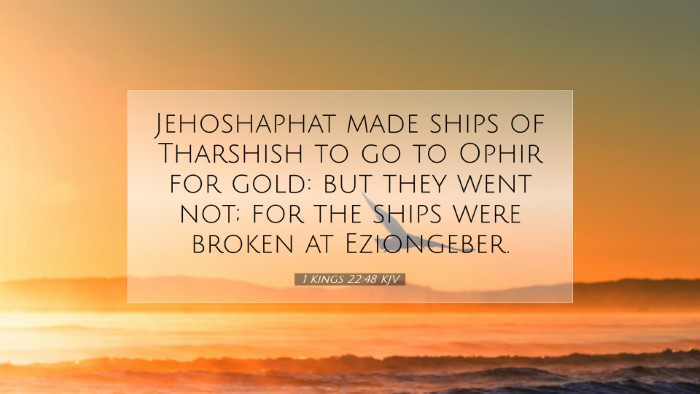Commentary on 1 Kings 22:48
1 Kings 22:48 states: "Jehoshaphat made ships of Tarshish to go to Ophir for gold: but they went not; for the ships were broken at Eziongeber."
Introduction
This verse encapsulates a significant moment in the reign of Jehoshaphat, the king of Judah, highlighting his ambition, the entangled politics of the time, and the divine providence that governs human affairs. It serves as a reminder of the limitations of human plans when they are not aligned with God's will.
Historical Context
Jehoshaphat, known for his religious reforms and alliances, aimed to strengthen Judah economically and militarily. His reign saw a desire to engage in trade with distant nations, which was a sign of prosperity. However, the fact that these ships didn’t reach their destination reflects the obstacles he faced, both politically and spiritually.
Commentary Insights
-
Matthew Henry:
Henry emphasizes that Jehoshaphat’s venture to build ships for trade, specifically those to Tarshish, illustrates a misguided reliance on human ingenuity rather than divine guidance. He notes that while alliances and trade are important, they must never override the necessity of seeking God’s favor. The failure of these ships serves as a clear indication of God's disapproval of this endeavor.
-
Albert Barnes:
Barnes comments on the failure of the ships as a divine intervention. This practical setback is seen as evidence that God can thwart human plans that don’t align with His purpose. Furthermore, Barnes relates that the ships being broken at Eziongeber should be interpreted as a warning to future leaders that trusting in military strategies and political alliances without seeking God can lead to downfall.
-
Adam Clarke:
Clarke provides an overview of the geographical and economic aspects of this venture. He notes that ships to Ophir were typically associated with great wealth, but advises that the failure of this expedition speaks volumes; it is a reminder that wealth gained through endeavors not blessed by God will ultimately lead to failure. Clarke reflects on the importance of aligning one’s actions with God’s will, particularly for leaders.
Theological Implications
This passage raises important theological questions regarding the nature of God’s sovereignty and human agency. It underscores a classic tension in Scripture between planning and providence. The ambitions of Jehoshaphat, although rooted in a desire for prosperity, ended in disappointment when divorced from divine endorsement.
Divine Providence
The failure of these ships can be seen as an expression of divine providence, reminding us that God's plans are ultimately unyielding. The ships being broken serves as a symbol of the futility of endeavors that do not consider divine will. Believers are urged to seek guidance before embarking on significant projects, emphasizing that success is contingent upon alignment with God’s plan.
Call to Spiritual Vigilance
1 Kings 22:48 calls for self-reflection among leaders and laypeople alike. It serves as a stark warning that meticulous plans and the shrewdest partnerships do not guarantee success unless they are grounded in faith. This narrative encourages continuous reliance on and communication with God in all matters, both personal and corporate.
Conclusion
As we reflect on the implications of 1 Kings 22:48, it becomes clear that the consequences of Jehoshaphat’s projects serve as an instructive lesson in humility and dependency on God. When human ambition is trumped by divine sovereignty, believers are drawn closer to the truth that, while it is commendable to seek prosperity and success, it is crucial to do so under the watchful eye of divine authority.
Application for Today
The message of this verse resonates with contemporary believers who seek to engage in endeavors within their communities and lives, reminding us to submit our plans to God. The overarching lesson is to pursue our objectives not just with diligence but with devotion, ensuring that our actions reflect our commitment to God's kingdom and His righteousness.


